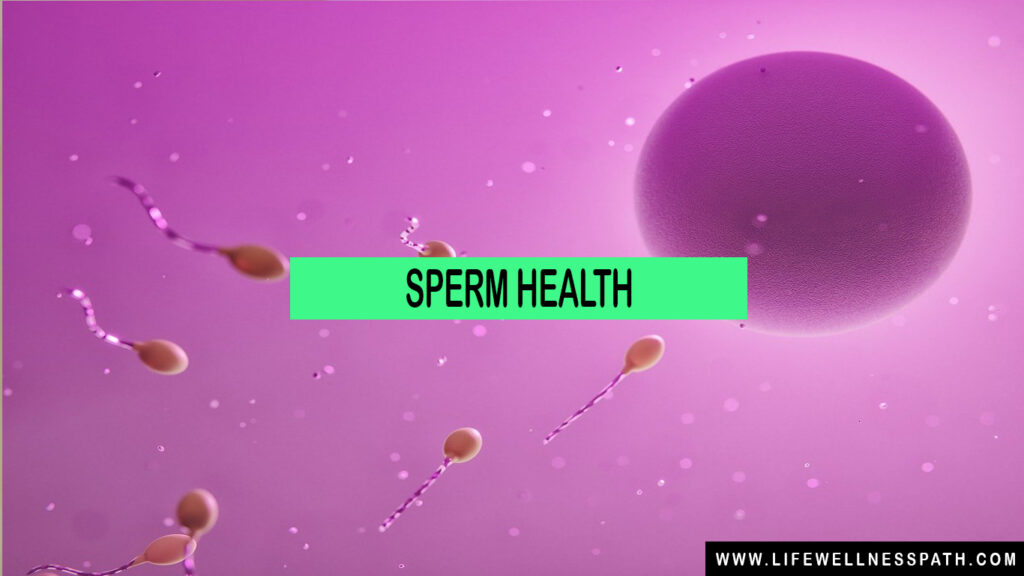Table of Contents
Sperm Health: Why It Matters for Fertility
When people talk about fertility, they often focus on women, but men play an equally crucial role. Sperm health is essential for conception. If sperm isn’t strong, healthy, and plentiful, getting pregnant can be tricky.
In this guide, we’ll cover everything you need to know about sperm health and how you can improve it. Whether you’re trying to conceive or just want to take better care of your reproductive health, we’ve got you covered.

How Sperm is Made: The Journey from Start to Finish
Ever wonder how sperm is made? It’s an amazing process that happens in your testes. It takes about 2-3 months for sperm to fully mature. During this time, your body goes through a bunch of steps to make sure the sperm is ready to fertilize an egg.
Sperm starts in small tubes called seminiferous tubules, then makes its way through your reproductive system, learning to swim along the way. Anything that interrupts this process can affect your sperm health and fertility.
What Makes Sperm Healthy? The Three Big Factors
Healthy sperm comes down to three main things: count, motility, and shape. Count is how many sperm are in your semen, motility is how well they swim, and shape refers to how “normal” they look.
You need a good mix of all three for optimal fertility. Issues with count, motility, or shape can make it harder to conceive. Knowing this can help you make better lifestyle choices to improve your sperm health.
What Hurts Sperm Health? The Common Culprits
There are several factors that can mess with sperm health. Things like smoking, drinking too much, eating poorly, or living a high-stress life can all take a toll on your sperm.
Even environmental things like exposure to pesticides, chemicals, or extreme heat can hurt sperm production. Recognizing what’s bad for your sperm is the first step toward making positive changes.
Eat Right for Sperm Health: What You Put In Matters
Ever heard the saying, “You are what you eat”? It applies to sperm health, too. A nutritious diet filled with fruits, vegetables, and whole grains can help your sperm thrive. On the flip side, junk food can drag your sperm health down.
Antioxidant-rich foods like leafy greens and berries are especially good for your sperm because they fight off damage from free radicals. The right diet can improve your sperm count and quality over time.
Best Foods for Sperm Health: Your Fertility Superfoods
Certain foods are amazing for boosting sperm health. Think of things like walnuts, fish, spinach, and berries. These foods are packed with nutrients like zinc, selenium, and folic acid, which are all key players in sperm production.
Adding these fertility-boosting superfoods to your daily diet can do wonders for your reproductive health. For instance, eating more fish can improve your sperm’s swimming ability, thanks to its healthy fats.
Foods to Avoid: What’s Bad for Your Sperm?
On the other hand, some foods are bad news for sperm health. Processed meats, fried foods, and sugary snacks can lower sperm count and quality. Too much caffeine and alcohol can also mess things up.
Cutting out unhealthy foods will help give your sperm the best chance at doing their job. If you’re serious about fertility, it’s time to say goodbye to junk food.
Boosting Sperm with Vitamins and Supplements
Sometimes, your diet alone isn’t enough to get all the nutrients your sperm need. That’s where vitamins and supplements come in. Nutrients like vitamin C, D, E, zinc, and folic acid are crucial for sperm health.
Supplements can give you an extra fertility boost, but it’s always a good idea to check with a doctor before starting any new regimen. They’ll help you find the right balance of nutrients.
Stay Hydrated for Healthy Sperm
Water does wonders for your body, and that includes sperm health. Staying hydrated keeps your reproductive system running smoothly and helps transport nutrients to your sperm-producing cells.
When you’re dehydrated, semen volume can drop, which makes it harder for sperm to get where they need to go. Drinking enough water each day can help keep your sperm healthy and active.
Exercise: Move Your Body for Better Sperm Health
Exercise is great for boosting sperm health. It can increase testosterone, reduce stress, and improve circulation – all of which help sperm production. Activities like jogging, swimming, or lifting weights can make a difference.
But don’t overdo it. Extreme exercise can actually harm sperm health, so stick to a balanced workout routine for the best results.
Stress: The Silent Sperm Killer
Stress isn’t just bad for your mental health – it can mess with your sperm, too. Chronic stress raises cortisol levels, which interferes with testosterone production and reduces sperm count.
Managing stress through techniques like meditation, deep breathing, or yoga can help protect your sperm health. The more relaxed you are, the better your body will perform, including sperm production.
Smoking and Sperm: Time to Kick the Habit
If you’re serious about improving your sperm health, quitting smoking should be at the top of your list. Smoking has been shown to lower sperm count and motility, not to mention damage sperm DNA.
Quitting smoking isn’t just great for your sperm – it’s beneficial for your entire body. You’ll feel better, breathe easier, and boost your chances of starting a family.
13. How Much Alcohol is Too Much?
A drink here and there might not be a big deal, but heavy alcohol consumption can take a toll on your sperm. Too much alcohol can lower testosterone and reduce sperm production.
Moderation is key. If you’re trying to conceive, consider cutting back or cutting out alcohol entirely to give your sperm a better shot at success.
Drugs and Sperm Health: What to Watch Out For
Recreational drugs like marijuana, cocaine, and opioids are bad news for sperm. They can lower sperm count, reduce motility, and even affect the sperm’s genetic material. Some prescription drugs may also impact sperm health, so it’s important to talk to your doctor if you’re on medication.
Avoiding these substances can go a long way toward improving your fertility.

Does Age Affect Sperm Health?
Yes, sperm quality declines with age, although men continue to produce sperm throughout their lives. After age 40, sperm count, motility, and DNA quality may decrease, increasing the risk of fertility problems.
Living a healthy lifestyle can help slow this process. A nutritious diet, regular exercise, and avoiding harmful habits can preserve sperm quality as you get older.
The Link Between Obesity and Sperm Health
Carrying extra weight can affect sperm health. Obesity can lead to lower testosterone levels and increase estrogen, which reduces sperm count and motility.
Shedding excess weight through a healthy diet and exercise can help restore hormone balance and improve sperm production. If you’re overweight, this is one of the most effective steps you can take to boost fertility.
Get Your Sleep: Resting for Better Reproduction
Sleep is vital for overall health, and sperm health is no exception. Lack of sleep or poor sleep quality can lower testosterone and reduce sperm production.
Aim for 7-8 hours of sleep each night to support your body’s natural reproductive processes. Good sleep doesn’t just recharge your body – it recharges your fertility, too.
Keep Cool: Why Heat is Bad for Sperm
Did you know that heat can damage your sperm? Your testes need to be cooler than the rest of your body to produce healthy sperm, so activities like sitting in hot tubs or wearing tight underwear can negatively impact sperm health.
If you’re trying to conceive, avoid prolonged exposure to heat and wear loose, breathable clothing. Keep things cool to give your sperm a fighting chance.
Watch Out for Environmental Toxins
Toxins from pesticides, heavy metals, and industrial chemicals can harm your sperm. Men who work in environments with frequent exposure to these toxins are at a higher risk of fertility issues.
Try to reduce your exposure to harmful chemicals both at work and at home. Taking care of your environment can directly benefit your reproductive health.
Do Phones and Laptops Affect Sperm Health?
There’s some evidence to suggest that keeping your phone in your pocket or placing your laptop on your lap for long periods could negatively affect sperm count and quality.
To be safe, avoid placing electronics near your reproductive area for extended periods. Small adjustments can help protect your sperm health.
Dealing with Male Infertility: When to Get Tested
If you’ve been trying to conceive for a while without success, it might be time to check your sperm health. Low sperm count or poor motility is one of the leading causes of male infertility.
Getting tested is a good first step toward understanding your fertility and finding the right solution.
Health Conditions That Affect Sperm
Certain health conditions like varicocele (enlarged veins in the scrotum) or hormone imbalances can affect sperm production. Even chronic conditions like diabetes or autoimmune disorders can play a role in fertility problems.
If you suspect an underlying health issue is affecting your sperm, it’s important to consult a doctor. Many conditions can be managed or treated to improve sperm health.
Fertility Treatments for Men
If lifestyle changes aren’t enough, fertility treatments like IVF or ICSI can help. These treatments can help men with low sperm count or poor motility achieve pregnancy.
Consulting with a fertility specialist can help you figure out what’s right for you. There’s always hope.
Natural Remedies for Sperm Health
Some men turn to natural remedies to improve sperm health, such as herbal supplements like ashwagandha or maca root. Acupuncture is also believed to help with male fertility.
Before trying any natural remedies, be sure to check with a healthcare professional to ensure they’re safe for you.
Protecting Your Sperm for the Future
Taking care of your sperm health now can preserve your fertility for the future. Whether you’re planning to start a family soon or want to keep your options open, the steps you take today will help protect your reproductive health for years to come.
Read More:25 Proven Tips for a Healthy Lifestyle for Fertility
FAQs about sperm health
- How can I make my sperm healthier?
- Adopting a balanced diet, exercising regularly, managing stress, avoiding smoking and excessive alcohol, and maintaining a healthy weight can all contribute to healthier sperm.
- How do you know if your sperm is healthy?
- Sperm health is often assessed through a semen analysis, which measures sperm count, motility (movement), morphology (shape), and overall semen quality.
- Is it OK to ejaculate daily?
- Ejaculating daily is generally considered safe and can actually help maintain healthy sperm production by reducing the accumulation of old sperm.
- Which foods increase sperm quality?
- Foods rich in antioxidants, such as fruits, vegetables, nuts, and seeds, along with foods high in zinc (e.g., oysters, beef) and omega-3 fatty acids (e.g., fish), can improve sperm quality.
- What are the signs of poor sperm health?
- Common signs include difficulty conceiving, changes in ejaculate volume, and any noticeable issues with sexual function or libido.
- Can stress affect sperm health?
- Yes, chronic stress can lower testosterone levels and negatively impact sperm production and quality.
- Does smoking affect sperm health?
- Smoking can reduce sperm count, motility, and overall quality, and can also damage sperm DNA.
- How does alcohol consumption impact sperm health?
- Excessive alcohol intake can lower testosterone levels, reduce sperm count, and impair sperm motility.
- Can obesity affect sperm quality?
- Yes, excess weight can lead to hormonal imbalances that affect sperm production and quality.
- What role does exercise play in sperm health?
- Regular moderate exercise can improve sperm count and motility, while excessive exercise might negatively impact sperm health.
- How important is sleep for sperm health?
- Quality sleep is crucial as it helps regulate hormones that influence sperm production.
- Can medications affect sperm health?
- Some medications can negatively impact sperm production or quality. It’s important to discuss any concerns with your doctor.
- Are there natural supplements that improve sperm health?
- Supplements like zinc, folic acid, vitamin C, and omega-3 fatty acids may improve sperm quality, but consult with a healthcare provider before starting any new supplements.
- How does age impact sperm health?
- Sperm quality typically declines with age, especially after 40, affecting count, motility, and genetic integrity.
- Can heat exposure harm sperm?
- Yes, prolonged exposure to heat (e.g., hot tubs, saunas) can negatively affect sperm production and quality.
- Does caffeine consumption impact sperm health?
- Moderate caffeine consumption is generally considered safe, but excessive intake may negatively affect sperm quality.
- How can environmental toxins affect sperm?
- Exposure to pesticides, heavy metals, and industrial chemicals can harm sperm production and quality.
- Is it safe to use performance-enhancing drugs?
- Many performance-enhancing drugs can negatively impact sperm health and fertility.
- How can I reduce exposure to toxins in my environment?
- Minimize contact with chemicals, use natural cleaning products, and ensure good ventilation in your living and working spaces.
- Can dehydration affect sperm health?
- Yes, staying hydrated is important for maintaining healthy sperm and proper semen volume.
- How does excessive heat from electronic devices affect sperm?
- Prolonged exposure to heat from devices like laptops or phones may potentially impact sperm health, so it’s wise to avoid placing these devices close to the reproductive area.
- What impact does smoking marijuana have on sperm health?
- Marijuana use can reduce sperm count, motility, and overall quality.
- Can chronic illness affect sperm health?
- Chronic conditions like diabetes or autoimmune disorders can impact sperm production and quality.
- Are there any specific vitamins that support sperm health?
- Vitamins such as C, D, and E, along with minerals like zinc and selenium, are beneficial for sperm health.
- How does stress management benefit sperm health?
- Effective stress management helps maintain hormonal balance and supports optimal sperm production.
- What is a semen analysis, and why is it important?
- A semen analysis evaluates sperm count, motility, morphology, and overall semen quality, providing crucial insights into reproductive health.
- Can herbal supplements improve sperm health?
- Some herbal supplements, such as ashwagandha or maca root, are believed to support sperm health, but it’s important to use them under medical guidance.
- How often should men get their sperm tested if they’re trying to conceive?
- It’s a good idea to get tested if conception issues persist after 6-12 months of trying, or sooner if there are concerns about sperm health.
- What lifestyle changes can improve sperm health?
- Adopting a healthy diet, regular exercise, managing stress, avoiding harmful substances, and maintaining a healthy weight can improve sperm health.
- Can infertility treatments improve sperm health?
- Infertility treatments, such as IVF or ICSI, can assist in conception even with compromised sperm health, but addressing lifestyle factors can also enhance overall sperm quality.







